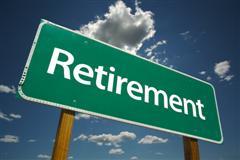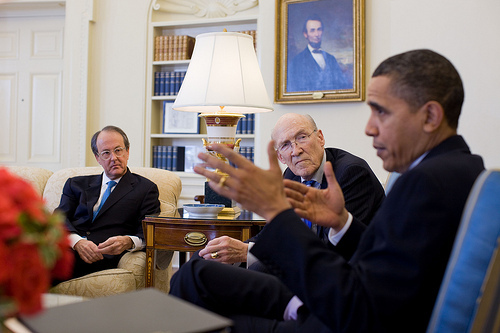| Home | About | Archives | RSS Feed |

The Independent Investor: Why Baby Boomers Are Grumpy
 You would think those born between 1946 and 1965 would have a lot to be thankful for. After all, the first wave of those baby boomers is finally eligible to retire in 2011. The recession appears to be over and jobs are beginning to make a comeback, even the stock market is performing well — so what's the problem?
You would think those born between 1946 and 1965 would have a lot to be thankful for. After all, the first wave of those baby boomers is finally eligible to retire in 2011. The recession appears to be over and jobs are beginning to make a comeback, even the stock market is performing well — so what's the problem?
The Pew Research Center's recent survey on baby boomers indicates that fully 80 percent are "dissatisfied with the way things are going in the country today."
Quite a bit of that unhappiness can be traced to personal finances and negative economic views. That makes sense since boomers were hit harder than most segments of the population by the double whammy of declining stock prices and housing prices. For those laid off who are older than 50 years of age, it has been harder to obtain a new job. And even those who are employed argue that real income has stagnated over the last decade. As a result, the majority say their household finances have worsened and a higher portion of boomers than other ages have had to cut spending this year.
The current estimate of baby boomers in America is 79 million, about 26 percent of the total U.S. population. Although they still consider retirement age at 65, the typical boomer believes that old age doesn't begin until age 72, according to the survey.
Times have changed since the boomers came of age in the '60s and '70s. Back then, America was the land of honey and horizons seemed to stretch forever. Now, most boomers point to the huge national debt, the deficit, a lack of political leadership and lament that America is past its prime. They and their country are in decline, or so the story goes.
"My parents worked hard, saved, retired and enjoyed their golden years," said one disgruntled boomer, (who gave me the idea for this column).
"Why can't I do the same?"
Actually, there are a number of reasons why this time around it is different and most of the fault lies with us Boomers. Back in the day, our parents were part of a pension plan that included monthly retirement savings on the company's tab. My Dad was a machinist at SKF (a ball-bearing manufacturer) for 30 years and worked another full-time job at night. The pension contributions increased as his salary rose and as the number of years worked at the company increased. His pension was conservatively managed by trained professionals. It was also fairly easy to calculate the money he would be receiving on the first day of retirement and my parents planned for that.
Their mortgage was fixed and ended right around the time of retirement. Your parents also knew how and what their medical plan would be in retirement as well as Social Security benefits. Most costs were controlled, or at least somewhat contained while families lived frugally and spurned debt. Some did so successfully and enjoyed those golden years, others (like my Dad who died of a massive heart attack a few years after retiring) didn't do so well, but at least the results were fairly predictable.
We baby boomers wanted more.
We did away with pensions and took control of our own retirement in the form of deferred-retirement plans like 401(k)s and IRAs. The problem was that contributing to those plans was voluntary (unlike pension plans). And somehow there was always something more important to spend our money on. Besides it was much more fun to "flip houses and make a killing" than make those monthly contributions toward retirement.
Even those who did save only kinda sorta did it. Self-directed, deferred-retirement plans should have done exceptionally well in the period from 1982 to 2000. It was the greatest bull market in recorded history, but few actually put enough money in these plans to make a difference. By 2001, when some of us actually began saving more, we watched those savings first disappear during the Dot-Com bust and then again more recently in 2008-2009. As a result, retirement plans actually went nowhere in the last decade.
As if that wasn't a low enough blow, those of us who counted on our houses to bail us out — the "I can always sell my house" crowd — witnessed that store of wealth decline 30 percent in the last two years. Houses are not moving, or if they are, sellers are forced to take a cut depending upon the size and location of your home. For someone forced to sell, faced with the prospect of living on social security with insufficient retirement savings, there is definitely something askew with the American Dream. It is no wonder that Boomers are grumbling. Many feel their country’s economic prowess has peaked and the promise of prosperity for all has been broken. Living the dream for many has turned into living a nightmare.
Maybe it was that old long-haired hippie in us that whispered we would live forever so why worry about retirement, or if we really had to, we could get by living in our old VW bus. It is only now that those romanticized notions are disappearing in the face of reality. But it is not too late. Maybe you can't retire at 65 but that may turn out to be a good thing. You can always start saving, and if I am right about the stock market this year, even first-time investors could make a substantial return on their money.
This country still holds promise for those willing to grasp it. No one is ever too old for that.
Bill Schmick is an independent investor with Berkshire Money Management. (See "About" for more information.) None of the information presented in any of these articles is intended to be and should not be construed as an endorsement of BMM or a solicitation to become a client of BMM. The reader should not assume that any strategies, or specific investments discussed are employed, bought, sold or held by BMM. Direct your inquiries to Bill at 1-888-232-6072 (toll free) or e-mail him at wschmick@fairpoint.net. Visit www.afewdollarsmore.com for more of Bill's insights.
| Tags: baby boomers, pensions, retirement |
The Independent Investor: And Now For That Deficit
|
President Obama speaks with Erskine Bowles, left, and former Sen. Alan Simpson in February before announcing their appointment to the deficit-reduction commission in this White House photo. |
The lame-duck Congress is finally getting to work. The president is horse trading with the Republican majority to extend the bush tax cuts before the end of the year. At the same time, the Obama budget deficit commission has released its findings and the full 18-member panel will vote on these proposals on Friday. Be prepared for some fireworks.
When the President Obama first appointed the bipartisan panel led by Erskine Bowles and former Sen. Alan Simpson, to come up with ideas to cut the exploding deficit, I wrote that we would have to wait until after elections before their findings would be revealed. Given some of the radical suggestions these deficit doctors have suggested I can understand why they are only now being revealed.
At long last the "untouchables" are on the table; those sacrosanct programs that no politician has had the guts to address in my lifetime. Taboo subjects such as Medicare, Medicaid, Social Security, farm subsidies, defense spending and mortgage interest rate deductions are on the table. If accepted in its entirety (and it won't be), the plan would reduce the deficit by $3.89 trillion between 2012 and 2020. The current national debt is about $13.9 trillion.
Here are some of the high points. Our complicated tax system and tax brackets would be collapsed into three brackets – 12, 22 and 28 percent. Itemized deductions would be eliminated; capital gains would be taxed as ordinary income. Contributions to tax-deferred accounts would be capped at 20 percent of income or $20,000, whichever is lower.
Although the plan would reduce income tax rates, there would be a price to pay. Your mortgage interest deduction would disappear, gas would be taxed at a higher rate, the retirement age of Social Security would increase and benefits for both Medicare and Medicaid will be cut. Over on the corporate side, taxes would be reduced as well to 28 percent from 35 percent. But employer provided health care exclusions would be capped and phased out altogether by 2038.
Now before you take sides on what you like or dislike about the proposals, understand that just about every interest group, every age group, every demographic profile you can come up with will both gain and lose by these proposals. Lobbyists will trash those proposals that threaten their clients and promote those that don't. On an individual level, I who have just purchased a home (and therefore a mortgage) in Pittsfield while less than five years away from social security and Medicare, will want my representatives to vote against those proposals but vote for a reduction in my income taxes.
You, my dear reader, will have your own agenda and want the deficit reduction to play out in a way that benefits you but takes nothing away from what you already have now.
This would be a mistake.
Our deficit is out of control. Many Boomers, their heads stuck in the sand, believe that if we pretend to ignore it, the deficit will soon become the problem of our future generations. We have gotten into the habit both individually and as a nation of kicking the can down the road. We mouth statements like "I'm glad I'm not growing up in America today" or "kids today will just have to work harder" or "our generation supported them, now it's their turn."
Maybe prior to the financial crisis, that short-sighted attitude would have worked. Now, several trillion dollars in debt later, the hard, sober facts are that if we don't make the sacrifices now to reduce the deficit dramatically, the Boomer generation is going to get clocked at the time when they can least afford it — in retirement. We share a number of economic and social conditions that could quite easily put us in the same position as Ireland, Italy, Spain and Greece. It wouldn't take much for our big lenders, like China and Japan to go on a debt buyer's strike, especially if the deficit continues to grow.
Nations around the world have already warned us of this possibility. Actions to replace the dollar by a basket of currencies are simply another warning shot across our bow. If the deficit continues to rise while America once again backs away from the hard choices we have to make in deficit reduction, then we will all see a spike in interest rates that will make your hair stand on end. Those rates will drive the economy into a depression and the stock market to new lows. Your retirement savings will disintegrate and we baby boomers will be bagging groceries at the supermarket at age 85 — if we are lucky.
So what's it going to be?
Bill Schmick is an independent investor with Berkshire Money Management. (See "About" for more information.) None of the information presented in any of these articles is intended to be and should not be construed as an endorsement of BMM or a solicitation to become a client of BMM. The reader should not assume that any strategies, or specific investments discussed are employed, bought, sold or held by BMM. Direct your inquiries to Bill at 1-888-232-6072 (toll free) or e-mail him at wschmick@fairpoint.net. Visit www.afewdollarsmore.com for more of Bill's insights.
| Tags: deficit, taxes, retirement |
The Independent Investor: Retire Later Rather Than Earlier
 Over the last year, a number of baby boomers I know have explored the option of early retirement. Between the financial crises, the recession and the volatility of the stock markets, burnout has hit the over-60 crowd. They yearn for a less stressful life and believe that early retirement is the answer. My advice is don't do it.
Over the last year, a number of baby boomers I know have explored the option of early retirement. Between the financial crises, the recession and the volatility of the stock markets, burnout has hit the over-60 crowd. They yearn for a less stressful life and believe that early retirement is the answer. My advice is don't do it.
The first factor to consider is whether you can afford to retire. The last two years have put a large dent in most tax-deferred savings plans. Some of that damage has been repaired, but by no means all, with most savers still down 20-25 percent from the peak value of their portfolios. All indications are that it will take several more years before the value of our investible assets fully recover.
"I still have my Social Security to fall back on," argued a 62-year-old engineer from a large Berkshire company, headquartered in the center of the county.
"Yes," I said, "but if you wait another eight years, you could pull in a heck of a lot more."
It is true that retired workers can begin collecting Social Security benefits at 62. But your benefits are reduced by as much as 30 percent if you do. Those born between 1943 and 1954 receive full benefits at age 66. The full retirement age increases gradually after that and for those born after 1960 the retirement age is now 67.
Take me for example: I'm 61, born in 1948, and plan to retire sometime after 70. Why?
Well, I could tell you I love my job, (which is true) and that I also love to write. Beyond that, it does not make any economic sense for me to retire before that. For every year I postpone retirement my Social Security benefits increase by 8 percent. A 32 percent increase in benefits over four years is not pocket change.
I also plan to continue working after I start claiming my benefits. Let's say Joe planned to retire next year, at 62. He can earn up to $14,160 without paying a penalty. Any more than that, however, and Social Security deducts 50 cents on every dollar from his benefits. If Joe waits until his retirement age of 66, his earnings limit climbs to $37,680 and the penalty for earning over that is reduced to 33 cents on the dollar. If Joe were to wait just one year longer, there would be no limit or penalty at all.
Since Social Security benefits are calculated based on your 35 highest years of earnings, and many of us are in our highest earnings years right now. It pays us to continue to earn more and bump up our earnings as much as we can.
There are also advantages if you are married. Spouses are entitled to Social Security payments of up to 50 percent of the higher earner's check provided they wait until full retirement age. Since it's still a man's world, I have made more than my wife throughout our working careers. Since we both work, we can claim spousal payments and individual payments and do so at different times.
My wife Barbara is 10 years younger than me. So let's says I retire at 70 percent. She can then claim a spousal payment of 50 percent at that time and then switch to payments based on her own work record a decade later. Those payments will be much higher because she chose to delay her own retirement until she was 70.
Today's boomers are in better shape, have less physically demanding jobs and higher salaries than any preceding generation before them. By working longer, we oldsters increase the productivity of the American economy, provide the workplace with leadership and creativity and reduce the burden of Social Security deficits and the high cost of Medicare on younger generations. Putting off retirement as long as you can makes a great deal of sense both individually and for the country overall. Who knows, you may live longer as well.
| Tags: retirement |
|


